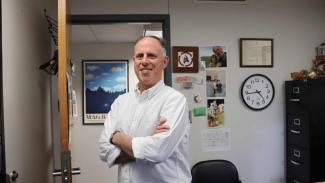
Explore a Philosophy Degree at CU Denver
What does it mean to be human in the age of artificial intelligence? That’s the question students in The Ethics of Artificial Intelligence, a new course offered by the University of Colorado Denver’s Philosophy Department, are grappling with this fall.
Taught by David Hildebrand in the Department of Philosophy, The Ethics of Artificial Intelligence (PHIL 3001/5001) is CU Denver’s first course dedicated entirely to the moral and social implications of AI. It invites students to think critically about how technology intersects with humanity, democracy, and justice—issues that feel increasingly urgent as AI reshapes nearly every aspect of modern life.
A Course for the Moment
Artificial intelligence is advancing faster than most can comprehend. Chatbots write essays, algorithms make hiring decisions, and data centers consume massive resources to train ever-larger models. Yet, many people using or building these systems rarely stop to ask: Should we?
For philosophy major Jasmine Cline, that question felt personal. “My dad is a software engineer, and so he was talking about all the AI stuff coming out. I had seen some news articles about some of the not-so-great things that were coming from it. I thought, you know what—this counts toward me graduating, and it’s something that I’m interested in. I also think it’s important to actually discuss the true ethics and how it could help and hurt us at the same time.”
 “This isn’t just about technology,” says Professor David Hildebrand. “It’s about how AI changes what it means to be human. Given AI’s growing influence, students know that future leaders must be able to thoughtfully navigate emerging ethical issues with the capacity to affect us all.”
“This isn’t just about technology,” says Professor David Hildebrand. “It’s about how AI changes what it means to be human. Given AI’s growing influence, students know that future leaders must be able to thoughtfully navigate emerging ethical issues with the capacity to affect us all.”
What Students Experience
The class of 19 students brings together a range of majors—from philosophy and computer science to music—creating a lively and inclusive space for discussion. Among those in the class is Christy Ameluxen, a third-year philosophy major, who says the course caught her attention because of how prevalent AI has already become in higher education and daily life.
"Ethics of AI is very topical,” she said. “It’s almost just the norm to use AI to get your stuff done, and teachers were using AI too. I wanted to be in a space where someone was leading a discussion on the ethical background behind what AI is doing.”
Ameluxen believes hearing diverse viewpoints has expanded her perspective. "Not everyone is coming from a philosophy or STEM major. We even have some people in the class that are music majors. It’s been interesting to hear different perspectives on AI use in different fields.”
Still, she admitted the conversations have reinforced her skepticism. “My views have become more solidified—being anti-AI—but it’s been interesting to hear different perspectives,” Ameluxen states.
Cline agreed, noting that class discussions have revealed both the promise and the cost of emerging technologies.
“I’m leaning more anti, but I can also see where it helps—like research that gives nonverbal autistic people new ways to communicate,” she said. “I hadn’t even thought about the environmental and economic impacts until people brought them up—like the water use in data centers and how utility companies push those costs onto consumers. That kind of thing really makes you think.”
Seeing the Effects Firsthand
For many students, these ideas aren’t just theoretical. Both Cline and Ameluxen work full-time while attending CU Denver and have already seen AI reshape their industries. “I work in the financial industry,” Cline notes. “It’s already starting to leak its way in. We used to have people that would put documents into the system and create cases for us. AI does all that now. People unfortunately lost their jobs. It’s made everything a little more efficient, but it’s also kind of hurting at the same time.”
Ameluxen shared a similar experience in her marketing role. “I work at a wellness center, and I was originally hired to be the lead of marketing. Almost my entire original job description has been taken over by AI. A lot of our client outreach and relationship-building is now done through AI, and even the analytics work is handled by it. It’s giving me more time to do other things, but it is taking away that actual person-to-person connection.”
Both students mentioned that tension—between innovation and humanity—is what makes the course so relevant.
“I think we do need to have more discussions about it,” Cline claims. “Other countries are starting to put in some blockers and laws to rein in the technology, so it doesn’t completely cut people out of jobs."
Why AI Ethics Matters
When asked how they’d explain the importance of AI ethics to a friend, Cline didn’t hesitate. “If I was to tell somebody, ‘You need to take this class,’ I’d tell my engineering friends. They really never think about the ethics behind it. Even when I was taking engineering courses, I didn’t learn about ethics—like, what working for an oil and gas company does to the environment or how it could hurt people. I think every comp-sci person should take a class like this. They need to take that hard look and ask, do I really want to do that?”
Ameluxen put it simply: “With how accessible AI is, and specifically large language models like ChatGPT, I think it’s irresponsible to not be informed. And I think that’s entirely the discussion that we’re having.”
At CU Denver, courses like The Ethics of Artificial Intelligence reflect the College of Liberal Arts and Sciences’ mission to prepare students not just for careers, but for meaningful impact in their communities and the world.
Philosophy may not promise easy answers, but as Hildebrand and his students demonstrate, it equips learners to ask better questions.
“I don’t think AI is going anywhere,” Cline explained. “So we’ll have to learn new skills to still have jobs. But it’s important we talk about it because if more people thought about the ethics behind it, maybe it could make things better.”
